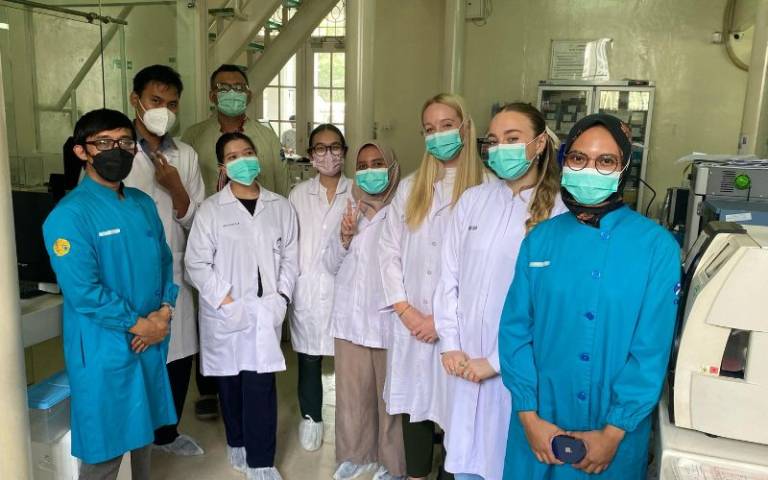Tackling rare dementia: Setting up a research site in Jakarta
Professor Jonathan Rohrer and Dr Rhian Convery (UCL Brain Sciences) used UCL Global Engagement Funds to set up a research site in Indonesia, to help tackle frontotemporal dementia.

12 April 2024
Frontotemporal dementia (FTD) is a rare type of dementia that typically affects people aged in their 50s and 60s, which is younger than people affected by Alzheimer’s disease. The disease affects behaviour, language and motor abilities, and there is a significant risk that the children of FTD patients will also develop the disease at some point in their lives. There are multiple mutations that cause the illness and it is frequently misdiagnosed. The small number of people diagnosed with the disease to participate in clinical trials means that a global response is needed.
As a result, the FTD Prevention Initiative (FPI) was set up in 2012 by Professor Jonathan Rohrer from UCL, and Dr Adam Boxer from the University of California San Francisco. The FPI aims to set up research sites across the world, to have enough researchers and participants for clinical trials in order to develop new treatments. Since its launch, the consortium has gathered data from a range of global locations, but they were lacking data from Asia and Southeast Asia.
This led to the team applying for UCL Global Engagement Funds (GEF) to help develop a new research site in Jakarta, Indonesia. Dr Rhian Convery (UCL Brain Sciences) and Phoebe Foster (UCL Dementia Research Centre) travelled to Jakarta in March 2024 to help set it up.
Designing FTD research in Jakarta
“For treating this type of disease, worldwide collaboration is the only way forward,” Rhian explained. “It's the only way we're going to be able to get enough people into clinical trials. FTD is very rare, so we need to work together across family members, academia and industry partners as well. A key focus of the FPI is to bring industry into the fold, and to create drugs that will work for our patients. So the more sites and people we have involved – and the more information we have about FTD patients too – the better.”
The FPI now has more than 300 researchers and 3,000 participants across the world. In Jakarta, the team collaborated with Dr Pukovisa Prawiroharjo, a Neurobehavior Consultant at Universitas Indonesia. The trip to Jakarta enabled Rhian and Phoebe to facilitate the creation of the research collaboration. First, they gained an understanding of the facilities that were available and the protocols already in place. They used this information to align protocols with the other research FPI research sites, to ensure they could collect the data required to enter the study.
Some of the ongoing work includes sharing scanning protocols and translating cognitive tests into Indonesian. One of these tests is an app called Ignite, that has been specifically designed to detect impairments related to FTD. So far, the app has been translated into 25 languages with the aim of rolling this out across the FPI. The team in Indonesia is currently supporting the translation of the app into Indonesian so it can be used as part of the study.
Next steps
“We’re still in the setup stage, but we’re a lot further ahead thanks to the trip to Jakarta,” Rhian said. “We're on a long road for clinical trial design, and there's definitely more work to be done in biomarker development and validation. But the goal of the FPI is to find the best practice, the best science and the best opportunities for patients and their families. The fact that Jakarta is now an FPI site means patients in Indonesia with FTD will have better access to treatment trials too.”
Since the Jakarta visit, Rhian and Phoebe have been able to connect members of the UCL team with members of the Jakarta team. They are coordinating their efforts to maximise the potential of the collaboration. Support for people and families affected by rare forms of dementia is one area that needs development in Indonesia. The UCL team is currently exploring ways it can help with this, which may include sharing best practice or offering online support services.
“I did my PhD at UCL and now I’m doing my postdoc here. I’ve had some incredible opportunities to travel, but never to the other side of the world before,” Rhian said. “It was really important for us to go to Jakarta and meet researchers doing some amazing work. The team was so welcoming and helped to expand my network. They invited me to speak at different events, including a general neurology symposium called JAKNEWS 11, ELEvating and Empowering Neurology (ELEVEN). It was an amazing experience for me as a researcher to be able to talk at such a high level conference. Overall, it was a really incredible trip that wouldn’t have been possible without funding from UCL Global Engagement.”
Links
- UCL Global Engagement Funds (GEF)
- FTD Prevention Initiative
- UCL Faculty of Brain Sciences
- UCL Dementia Research Centre
- Professor Jonathan Rohrer's academic profile
- Dr Rhian Convery academic profile
- Phoebe Foster academic profile
Image
Dr Rhian Convery (UCL Brain Sciences) and Phoebe Foster (UCL Dementia Research Centre) tour the laboratory with the research team at Universitas Indonesia.
 Close
Close

